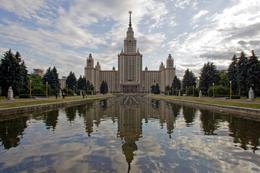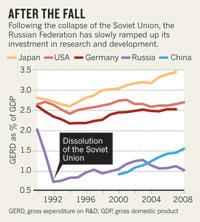 Scientists at Moscow State University have been helped by colleagues but hindered by bureaucracy.G. S. de Blonsky/Alamy
Scientists at Moscow State University have been helped by colleagues but hindered by bureaucracy.G. S. de Blonsky/AlamySiberia, of all places? Ernst-Detlef Schulze's wife rolled her eyes when her husband agreed to lead a major ecosystem study in the Yenisey region in the heart of Russia's eastern vastness. At first, Schulze, the founding director of the prestigious Max Planck Institute for Biogeochemistry in Jena, Germany, had been hesitant himself — but sensing a unique opportunity to study how the Arctic tundra and boreal forests store and release carbon, he decided to pack his bags.
The German carbon-cycle expert is one of 40 foreign or expatriate Russian scientists working in the West who last year received a new type of grant to bring their expertise to Russian universities. The 12-billion-rouble (US$428-million) 'mega-grant' programme is part of Russia's attempt to strengthen research at its neglected universities and modernize the country's science and economy at large (see Nature 465, 858; 2010).
The ambitious plan is clear evidence that research money is now flowing generously in Russia, where a once-vast scientific workforce shrank dramatically in the years after the collapse of the Soviet Union (see 'After the fall'). The will to revitalize science is real, says Schulze. Alas, Kafkaesque bureaucracy and a thicket of often-opaque regulations have survived the changes.
 Click for larger image
Click for larger imageThe Russian government is trying to smooth the way. This week, following a letter of complaint from scientists at Moscow State University (MSU), President Dmitry Medvedev met grant recipients to discuss the problems they have experienced, and promised to address them. But doing science in Russia remains a challenging, and often frustrating, mission for anyone unfamiliar with the country's idiosyncrasies, says Schulze.
"The administrative, legal and academic environment can be perplexing," he says. "Essentially, you need very good contacts and a great deal of local support. If you arrive unprepared — thinking only that it would be cool to do some science in Siberia — you're lost."
Fortunately, Schulze does enjoy plenty of support. During his long career he has published more than 20 papers with Russian colleagues, and some of his long-term collaborators are now helping him to get settled at his host institute, the Siberian Federal University in Krasnoyarsk.
"Our faculty and our students are very lucky to have Detlef doing research here," says Evgeny Vaganov, the rector of the university. "We do everything we can to support him with the admittedly excessive paperwork."
Vaganov has commissioned a professor of economics to support Schulze full-time with the logistics of his planned fieldwork, with the procurement and import of equipment, and in his interactions with local and state authorities. Even so, the purchase of every single piece of equipment for Schulze's project had to be approved by the Russian security services, who Schulze says are usually suspicious of his efforts. "If it's new it's bad," he says. "That's the kind of mindset, unfortunately, that is hampering Russia's intellectual and technological renaissance. It is blocking curiosity and inventive genius."
Similar problems crop up when buying chemical reagents or transporting biological samples into or out of Russia. "In Sweden, if I need a chemical I order it, and I'll get it in a matter of days," says Boris Zhivotovsky, a cell biologist at the Karolinska Institute in Stockholm and a holder of one of the grants, which he is using to set up a lab and PhD programme at MSU. "In Russia, you need to apply for, and put out to tender, every little thing you need for your research," he says. "It takes three months or more until you get what you need."
Other grant recipients worry about the time limits they face. "My main concern is what will happen after the two-year funding period," says Stanislav Smirnov, a mathematician at the University of Geneva, Switzerland, and winner of the 2010 Fields Medal, who is using his grant to work at St Petersburg State University. "In mathematics, it can easily take two years to get one paper published. If this programme is to have a lasting impact, I think there would need to be a mechanism for expanding it beyond the short two-year funding period. Otherwise I fear the investment will just peter out."
The mega-grant programme is part of a much wider drive to boost science and innovation. Four years ago, the Russian government launched an ambitious 318-billion-rouble nanotechnology initiative (see Nature 461, 1036–1037; 2009). And a science and innovation centre currently being built in Skolkovo near Moscow will host Russian and foreign entrepreneurs and companies, including heavyweights such as Siemens and Bosch. Commercial research and development activities are expected to begin next year in five key areas — energy, information and communication, biotechnology, space and nuclear technologies.
But the poorly developed technology-transfer process at Russia's academic institutions is proving to be a major problem, says grant-holder Alexander Kabanov, a biochemist at the Nebraska Medical Center in Omaha, who is setting up a drug-discovery group at MSU. In the absence of a well established domestic patent system (and with no budget available at universities for filing patents in the European Union or the United States), collaborators in intellectual-property-intensive fields such as Kabanov's risk leaving their inventions inadequately protected.
Russia's regulations governing the welfare of animals used in experiments are also less stringent than in many other countries, which can cause problems for scientists who want to publish in international journals. "It's a touchy issue," says Kabanov. "It is important that what we do is not considered questionable in the West. When it comes to animal experiments, we need to apply the same protocols and ethical standards as we do everywhere else."
Meanwhile, the Russian science ministry has already confirmed its commitment to the scheme by announcing a second call for proposals. "I expect they'll get at least twice as many applications as in the first round," says Vaganov, who is currently helping researchers to prepare six applications for projects to be hosted by the Siberian Federal University. "Despite some problems," he says, "this programme is a wonderful opportunity to uplift Russian science and get our students in touch with world-class research happening at our doorsteps."
